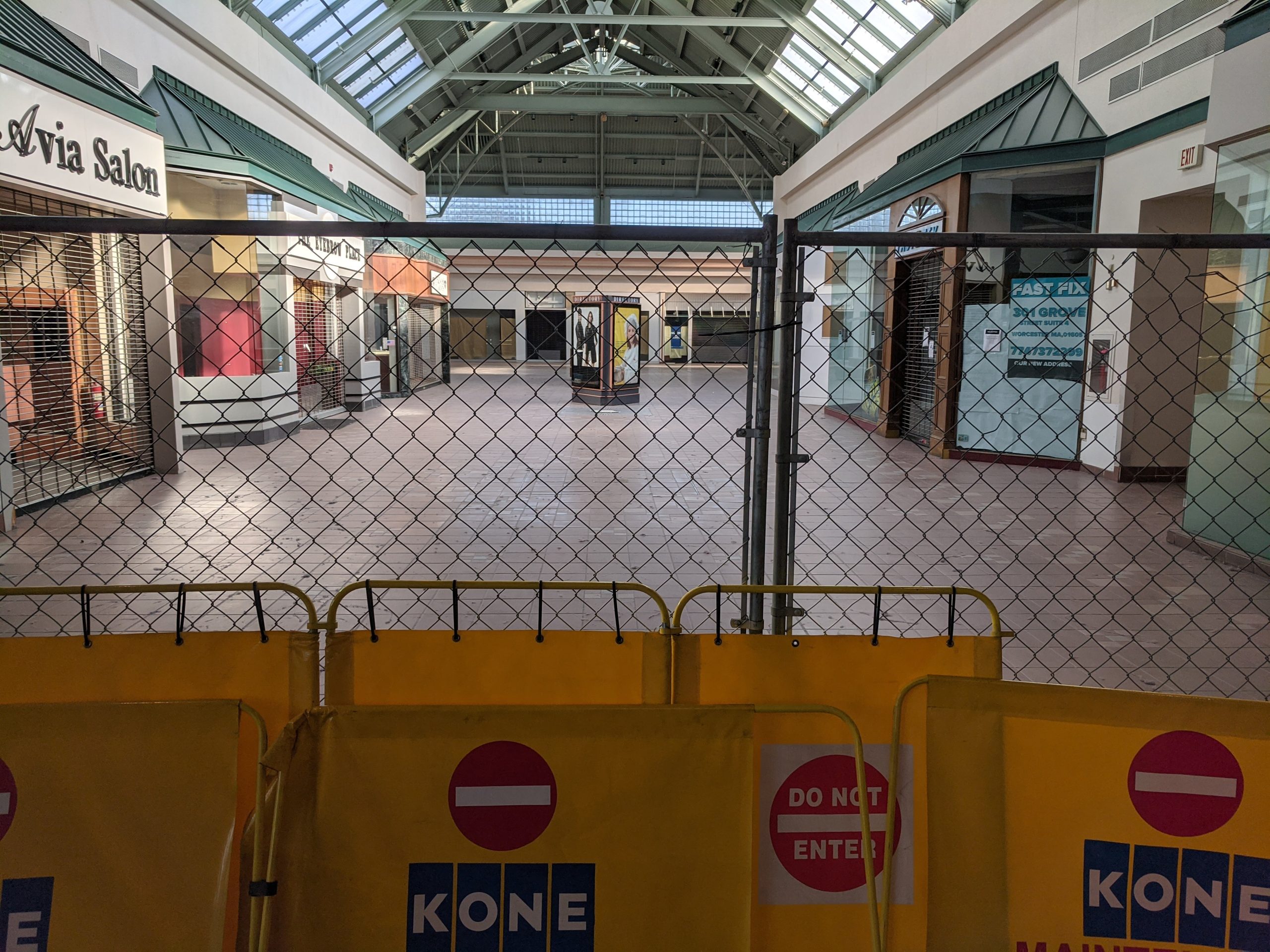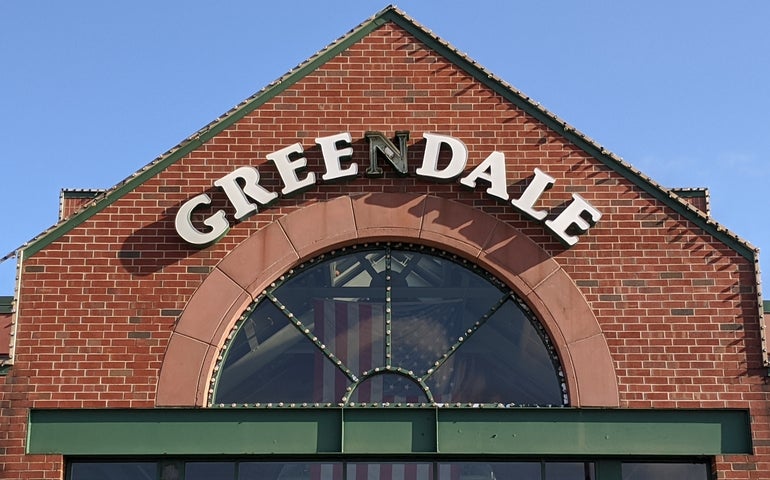The Greendale Mall, now down to a single tenant, wasn’t especially unusual as a fading shopping mall at a time when retail is struggling and indoor shopping centers in particular have fallen out of fashion.
But the Worcester mall’s apparent fate as a future Amazon fulfillment center would make it a first: the only shopping mall in New England to be converted into industrial use, according to the national real estate firm CBRE, which tracks such shifting uses.
The irony of the conversion – Amazon replacing a mall whose former tenants it no doubt helped run out of business – would further the decline of such retail in the city of Worcester. The city once had two enclosed shopping malls – the Galleria, which refashioned itself as an outlet mall in its last attempt at success, closed in 2006 – will now have none. Today, the Greendale Mall has only a single tenant: a T.J. Maxx and HomeGoods store. The rest of the mall is blocked off.
An initial plan by Boston developer Finard Properties to remake the Greendale Mall as a denser mixed-use lifestyle center has been pushed aside in favor of a sprawling distribution center to take advantage of the site’s proximity to I-190 and I-290.
The e-commerce trend
Other malls in Massachusetts have been repurposed before, including one in Fall River that became an outdoor shopping center, and two similar projects underway now in Hanover, Watertown and Woburn. The Greendale Mall will be the first in New England to be made into an industrial site, according to CBRE.
The trend is driven by e-commerce, according to the real estate firm, which counts 59 such projects nationally since 2017, as of July. In total, 13.8 million square feet of retail space was converted into 15.5 million square feet of industrial use. In the Greendale Mall’s case, the Amazon warehouse will be far smaller: less than a third of the size of the mostly empty mall it’s slated to replace.
Underperforming retail sites have become ideal for so-called last-mile warehouse developers – generally smaller centers than the biggest fulfillment centers – because they’re typically near population centers and already have large parking lots, CBRE said.
Amazon has been gobbling up space nationally during the pandemic. The company said in an earnings call in late October it plans to expand its fulfillment and logistics square footage by 50% this year, predominantly in the third and fourth quarters. Amazon has 726 facilities across the country and another 247 in the pipeline that would bring its footprint to 347 million square feet, according to the logistics industry analyst MWPVL.

“Amazon’s industrial growth – both locally and nationally – has been nothing less than remarkable,” Aaron Jodka, an analyst for Colliers International in Boston, wrote in a market report in August.
That growth includes new warehouses across Central and Eastern Massachusetts, according to the real estate firm Hunneman. In the third quarter alone, Amazon signed leases for 322,000 square feet in Milford, a site later sold in November for more than $50 million, and more typically sized facilities ranging from 148,000 to 193,000 square feet in Hingham, Norwood and Salem. It signed new leases in Canton and Taunton this year, following two Central Massachusetts additions late last year in Bellingham and Northborough. It has proposed a 3.8-million-square-foot warehouse in North Andover.
“Being that Amazon has the pockets to do so, there are rumors of the online retail giant taking on retail store and mall conversions,” Hunneman foreshadowed.
Greendale Mall-to-Amazon
Amazon hasn’t committed to the Greendale Mall site but the hints are obvious in permitting applications for the property: The number of planned electric vans matches exactly those of Amazon’s climate-related goals, and a planned gray and blue exterior matches what the company typically builds. Amazon doesn’t yet have a fulfillment center in Worcester or adjacent towns.
Finard Properties, the Boston development firm that bought the mall in December 2019 for $7.1 million, has applied for permitting approval from the city to demolish the mall and build the new warehouse. The planned single-story, 121,000-square-foot warehouse requires site plan approval and is slated to go before the Worcester Planning Board.
The firm has declined to offer more details on the plan.
Finard initially offered a far different plan, with apartments and medical offices replacing the mall. The firm said then it was excited to be part of Worcester’s growth and it had hired a design-and-engineering team to draw up plans for the remade property.
“The era of enclosed shopping centers has passed,” Finard, the CEO, said at the time. “Shoppers have embraced places like Northborough Crossing and MarketStreet in Lynnfield with its apartments, health clinic, medical offices, and retail.”
The Greendale Mall’s demise will leave Worcester without an enclosed shopping mall for the first time in about five decades, at a time when brick-and-mortar retail is being crushed in the short term by the pandemic and in the long term by a shift to online shopping.
The Galleria mall downtown was demolished and replaced with a mix of uses, including an office building, hotel and apartments. One notable outdoor retail plaza has opened in the past few years, the Trolley Yard development on Grove Street, whose tenants include a Starbucks, Chipotle, Hot Table Panini, two banks and a day care. Downtown Worcester has dozens of empty storefronts, and a planned mixed-use development across from the $132-million Polar Park baseball stadium has been delayed, with its prospects for demand for new retail – along with offices, a hotel and apartments – seeming less certain.
Instead, the area’s retail destinations have shifted outside of the city, including to the Shoppes at Blackstone Valley in Millbury, which opened in 2003, Northborough Crossing, which opened in 2011, and Lakeway Commons, which opened in Shrewsbury in 2017. Another major retail development is under construction on Route 20 in Shrewsbury, Edgemere Crossing at Flint Pond, which will total 145,000 square feet of retail space, including a Market Basket grocery store, along with 250 apartments.
As for the Greendale Mall’s last tenants, the T.J. Maxx and HomeGoods store is rumored to be moving to Lincoln Plaza in Worcester, where three empty storefronts stand where Staples, A.C. Moore and Barnes & Noble have closed. Framingham-based TJX Cos., the owner of T.J. Maxx and Marshalls, has not commented on a potential move to Lincoln Plaza.

